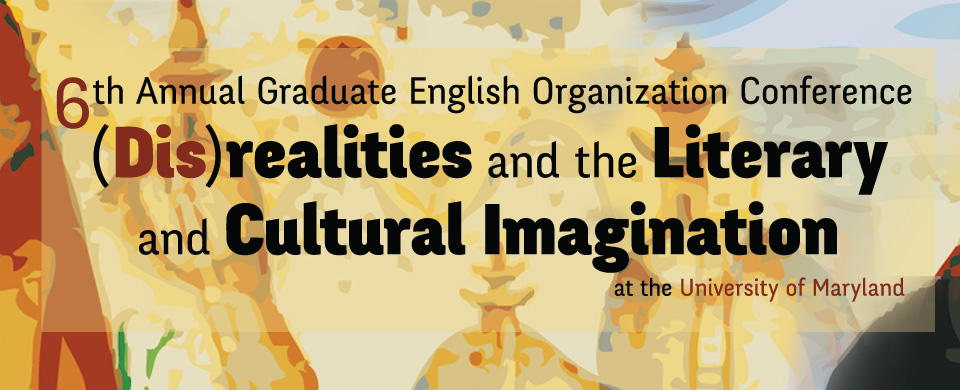November 6, 2012
Plenary Speakers
The GEO Conference Committee is pleased to announce
the plenary panel for its upcoming conference "(Dis)realities and the Literary and Cultural Imagination"
scheduled for April 5-6, 2013. Panelists include Maud Casey of the Department
of English, Matthew Kirschenbaum of the Department of English and Maryland
Institute for Technology in the Humanities, Vessela Valiavitcharska of the
Department of English, Christina Hanhardt of the Department of American
Studies, and Faedra Carpenter of the School of Theatre, Dance, and
Performance Studies. All speakers are from academic departments at the
University of Maryland, College Park.
November 2, 2012
Call for Papers
6th Annual GEO Conference
“(Dis)realities and the Literary and Cultural Imagination”
Department of English University of Maryland, College Park
April 5-6, 2013
Abstracts are due December 7, 2012 and should be emailed to conference.geo@gmail.com.
“(Dis)realities and the Literary and Cultural Imagination”
Department of English University of Maryland, College Park
April 5-6, 2013
What is
(dis)reality? In The Metaphysics of
Virtual Reality, Michael Heim notes the multiple attempts to define reality
in Western history. The effort to delineate reality begins with Plato’s notion
of ideal forms as the “really real,” through Aristotle’s emphasis on material
substance. Reality in medieval times is mirrored in the shimmer of religious
symbols; efforts to catalogue the real mark the Renaissance, and the atomic
bomb defines the reality of the Modern era. In contrast, material
representations of the “real” are often surreal, intangible, and unregulated in
Latin American, Caribbean and African literatures and cultures e.g. the work of
Gabriel García
Márquez, Ben Okri, amongst many others. In all these examples, perceptions and
definitions of reality rely on a defined set of cultural codes.
These cultural codes
continue to challenge efforts to move perceptions and interpretations of
reality beyond their fixed boundaries. For example, in “Painting
as a Libidinal Set-Up,” Jean-François Lyotard’s postmodern notion of material art as a conduit for unregulated
desire and transformative sensation is an attempt to move reality beyond its
boundaries into (dis)reality. However, as he points out, it remains impossible
to escape the regulating effects of the “real” in the form of military power,
capital, and language. If, as Lyotard suggests, (dis)reality is a principle
that undermines what we commonly refer to as reality and the discourses that
surround it, how is this principle expressed in literature and culture?
(Dis)reality is an
imaginative category we would like to open to interpretation within various
disciplines. This conference seeks to explore Western and non-Western notions
of (dis)reality and its relationship to realities in various cultural and
literary imaginaries. Questions to consider include, what do we mean when we
say “(dis)reality”? Who and what delineate the constraints of (dis)reality? In
what ways has “reality” been defined, upheld, or employed? In what ways has a
“reality” been challenged, undermined, brought into play, and (dis)located by
various writers and cultures? How do we understand the histories of Western and
non-Western realities in the Digital Age?
Submissions that
engage with all aspects of the title are invited. Presentations
of creative work in Fiction, Poetry, Drama, Dance, Arts and Film are welcome. Topics
of potential essays can include, but are not limited to:
· Fictive spaces and temporalities
· Cultural (re)interpretations of reality
· Pedagogy and reality
· Rhetorical Realities
· Utopias and Dystopias
· (Post)colonial conflicts over and/or
redefinitions of reality
· Discursive constructions of race, gender, or
sexuality in various historical eras
· Transnational identities and literatures
· Subaltern, displaced, or dislocated realities
· Mediating reality in drama: reading tragedy
or comedy
· Art and performance as representation or
imaginative possibility
· Reality and history through film, literature,
or other artistic mediums
· Virtual reality
The
conference committee invites proposals for fifteen-minute papers from a broad
range of disciplines and theoretical backgrounds. Proposals
on creative work must be a short sample from an original composition. Panel
submissions (3-4 participants) are highly encouraged. Please limit
individual abstracts to 300 words and panel abstracts to 500 words. Full papers
may accompany abstracts. And please include three keywords at the end of the
abstract to assist panel formation.
Abstracts are due December 7, 2012 and should be emailed to conference.geo@gmail.com.
Subscribe to:
Posts (Atom)
